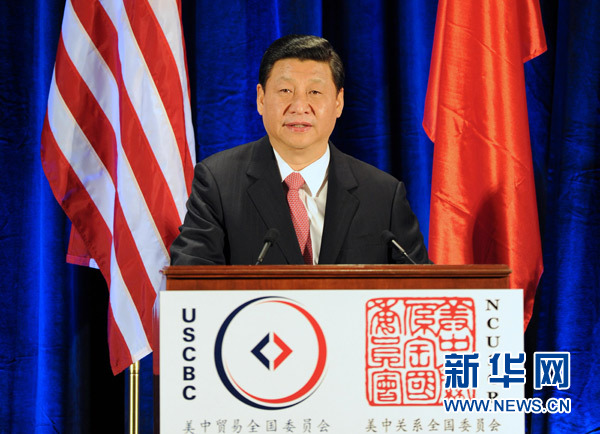US, China should respect each others' core interests
 0 Comment(s)
0 Comment(s) Print
Print E-mail Xinhua, February 16, 2012
E-mail Xinhua, February 16, 2012
Chinese Vice President Xi Jinping said on Wednesday that China and the United States should increase strategic trust and respect core interests and major concerns of each other.
 |
|
Chinese Vice President Xi Jinping addresses a luncheon hosted by the National Committee on U.S.-China Relations and the U.S.-China Business Council, Feb. 15, 2012. |
"Without trust, one can achieve nothing," Xi said, citing a Chinese saying.
China and the United States have important interwoven interests, said the Chinese leader. "For us, strategic trust is the foundation for mutually beneficial cooperation, and greater trust will lead to broader cooperation."
The two sides should increase mutual understanding and trust, and reduce misunderstanding and suspicion, said Xi.
U.S. President Barack Obama said on a number of occasions that the United States welcomes a strong, prosperous and successful China that plays a greater role in world affairs. Vice President Biden stressed in an article he wrote after his visit to China last August that China's rise is not America's demise, Xi said.
"We in China hope to work with the U.S. side to maintain close high-level exchanges. We hope to increase dialogue and exchange of views with the United States by making full use of our channels of communication, including the Strategic and Economic Dialogues, cultural and people-to-people exchanges, and military-to-military exchanges," he said.
"By doing so, we can better appreciate each other's strategic intentions and development goals, avoid misinterpretation and misjudgment, build up mutual understanding and strategic trust, and on that basis, fully tap our cooperation potential."
The Chinese vice president also pointed out that the two sides should respect each other's core interests and major concerns.
"History shows that when we properly handle each other's core and major interests, China-U.S. relations will grow smoothly. Otherwise, they will be in trouble," he said.
He stressed that China hopes the United States will adhere to the three Sino-U.S. Joint Communiques and the one-China policy, oppose "Taiwan independence" and support the peaceful development of relations across the Taiwan Straits with concrete actions.
China also hopes that the United States will truly honor its commitment of recognizing Tibet as part of China and opposing "Tibet independence," and handle Tibet-related issues in a prudent and proper manner.
On human rights, Xi said it is natural that some differences exist on the issue given the differences in national conditions as well as historical and cultural background between the two countries.
China and the United States should continue dialogue and exchanges to implement the consensus reached between presidents of the two countries on respecting each other's development paths chosen in light of their national conditions, and improve the cause of human rights in both countries, Xi said.
"China-U.S. relations are now at a new historical starting point in the second decade of the 21st century," he said.





